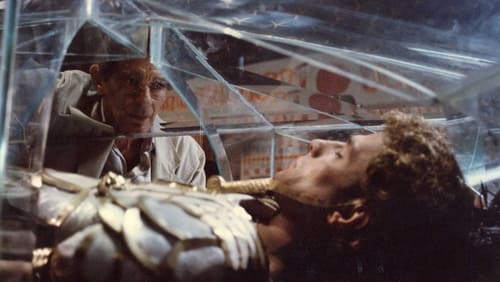
Graphic portrayal of society's struggle to balance tradition and modernity in modern-day Egypt. "Girl's Secrets" tells the story of sixteen-year-old Yasmeen, whose out-of-wedlock pregnancy sparks tragic consequences. The film articulates the many questions on the minds of most Egyptians and Muslims around the world: Should women abide by Islam's stringent dress code? How can parents screen out unwanted Western influences? Should Egyptian schools teach sex education? Should teen-age boys and girls socialize?

La historia está ambientada en al-Andalus en el siglo XII, donde el famoso filósofo Averroes es nombrado juez por el gran califa. Rivales políticos del califa, centrados en el líder de una secta islámica fanática, obligan al califa a enviar a Averroes al exilio, pero sus ideas siguen viviendo gracias a sus alumnos.

Set in 1987 against the backdrop of a hunger strike by the Egyptian film industry, Chahine himself steps in to play Yehia, the famed Egyptian director whose life is chronicled in "Alexandria, Why?" and "An Egyptian Story". Obsessed with Amr, the handsome actor he discovered and cast as his alter-ego in parts one and two of The Alexandria Trilogy, Yehia pressures Amr to star in various film projects that change even as Yehia's perception of the young actor begins to change. He first casts Amr as Hamlet, which the actor deems too demanding for his talents, then as the lead in a musical biopic of demigod Alexander the Great, who founded the city of Alexandria in 332 B.C.

Thutenakht
Based on one of the major literary texts survived from the Middle Kingdom, the classical period of Egyptian literature, The Eloquent Peasant is a combination of a morality/folk tale and a poem. The events are set between 2160 and 2025 BC. When the peasant Khun-anup and his donkey stumble upon the lands of the noble Rensi, the peasant’s goods are confiscated and he’s unjustly accused of theft. The peasant petitions Rensi who is so taken by the peasant’s eloquence that he report his astonishing discovery to the king. The king realises the peasant has been wronged but delays judgement so as to he can hear more of his eloquence. The peasant makes a total of nine petitions until finally, his goods are returned.

Brother
La momia está basada en hechos reales. En 1881 aparecen en el mercado una serie de objetos procedentes de la dinastía Tanita. Se descubre que la tribu de los Horabat había saqueado en secreto las tumbas de los faraones de Tebas (hoy Luxor). La Escuela de Arqueología de El Cairo encontró las tumbas en un lugar recóndito del Valle de los Reyes. A través de esta película, el realizador Shadi Abd al-Salam plantea importantes cuestiones acerca de la relación entre pasado y presente, las creencias y la profanación, la muerte.




